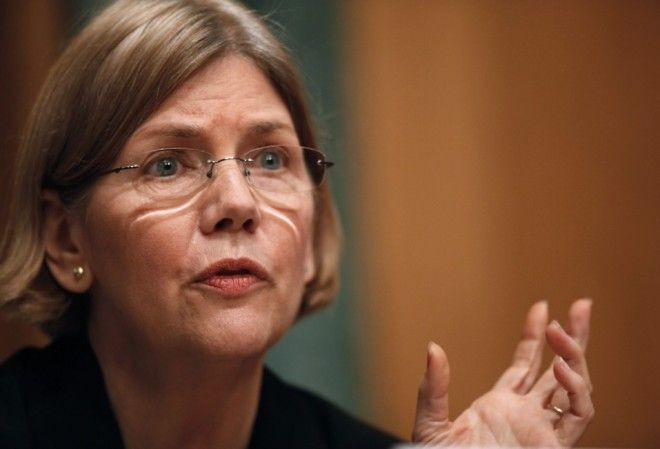Why Eric Schneiderman and Elizabeth Warren Matter for Progressives
ANALYSIS

With a White House that has moved its agenda through deals and compromises, at times to the chagrin of liberals, progressives can get their policy itches scratched by New York Attorney General Eric Schneiderman and Consumer Finance Protection Bureau architect Elizabeth Warren.
Both Democrats are unabashed liberals, but their appeal is rooted in their actions against Wall Street.
Schneiderman has sought to torpedo two major settlements related to the mortgage-backed securities and allegedly wrongful foreclosure practices. Meanwhile, Warren, a Harvard professor, has launched a U.S. Senate campaign in Massachusetts after making a name for herself by setting up the CFPB, even though President Brack Obama never even nominated her to head it.
Both of them are not afraid of Wall Street. They're not afraid of the banks, said Hank Sheinkopf, a longtime Democratic campaign consultant in New York. Anyone running who takes on Wall Street and takes on the banks is guaranteed to get a great hurrah from average citizens in the street.
New York's New 'White Knight of Wall Street'
In his nine months as New York state attorney general, Schneiderman, a former state senator from Manhattan's Upper West Side, has kept a relatively low profile compared with his predecessors, future governors Eliot Spitzer and Andrew Cuomo.
Rather than take Spitzer's White Knight of Wall Street moniker, Schneiderman has taken a more subtle approach in his actions against banking and financial institutions.
Still, his work on bank settlements prompted Politico's Ben Smith to ask if Schneiderman is America's most powerful liberal. Glenn Greenwald at Salon praised Schneiderman for his seemingly solitary fight to hold Wall Street accountable for the financial collapse.
Perhaps he is the top liberal in the U.S. He has subpoena power as the top attorney for New York, home to the world's financial center. He has also flexed some muscle, taking on subprime mortgage-related settlements he deemed too lenient for banks.
In August, Schneiderman tried to block court approval of an $8.5 billion agreement between Bank of America and Bank of New York Mellon to settle claims over mortgage-backed securities. Instead of bashing the banks from a bully pulpit during a press conference, he had his court filing do the talking for him.
In it, Schneiderman called the $8.5 billion settlement figure a fraction of the losses suffered by investors and accused Bank of New York Mellon of misleading investors in securitizing mortgages.
Though Bank of New York Mellon criticized Schneiderman's bid to intervene in its settlement, it took notice of his legal ingenuity. There is no precedent for such an intervention or for Schneiderman's legal theory in bringing the action, the bank said in a court filing.
Schneiderman also opposed a deal to provide banks immunity from civil action if a settlement over poor foreclosure practices with 50 state attorneys general is signed.
The bank immunity issue already caused California Attorney General Kamala Harris to pull out of negotiations, the Los Angeles Times reported Friday. Schneiderman's position against blanket immunity for banks has received support from fellow attorneys general in states including Kentucky, Minnesota and Delaware.
Warren's Economic Populism vs. Brown's 'Regular Guy' Appeal?
Campaigning in a red pickup truck, Republican Scott Brown scored a surprise victory in Massachusetts' special U.S. Senate election in early 2010. Now, Bay State voters will likely see him go toe-to-toe with Warren, the Harvard professor who devised and help set up the Consumer Financial Protection Bureau.
A new poll from UMass Lowell/Boston Herald showed Warren slightly trailing Brown within the margin of error, 41-38, a statistical tie. She already has an early and commanding lead in the Democratic primary.
I like her commitment to not protect the big banks, one Massachusetts voter polled told the Boston Globe.
If Warren can take down the personally popular Brown in November 2012, it will be taken as proof that progressive policies can win political arguments.
If economic populism works once, you'll see politicians running for office become addicted to it like crack, Sheinkopf said. If it doesn't work, you'll see them run in the other direction.
It is a theme that seems to be catching on with progressives. The Progressive Change Campaign Committee, which aims to elect bold progressives, is boosting Warren's candidacy and raising funds for her campaign.
Her campaign gained attention from video of Warren giving a full-throated defense of progressive economic policies that has gone viral among liberals. In the clip, Warren says nobody in this country who got rich on his own, as the rich rely on good roads and an educated workforce.
You built a factory and it turned into something terrific, or a great idea? God bless, she said. Keep a big hunk of it. But part of the underlying social contract is you take a hunk of that and pay forward for the next kid who comes along.
While liberals may have enjoyed the video, The Washington Post said in September that her rhetoric suggests that she could prove too liberal for even Massachusetts.
Brown's campaign seems intent on pushing that sentiment if Warren is the Democratic nominee. The Hill on Monday obtained a campaign memo from Brown's team that said a long, divisive and expensive Democrat primary will undoubtedly produce a hard-left ideologue whose out-of-touch philosophy will be out of step with these voters.
© Copyright IBTimes 2024. All rights reserved.





















